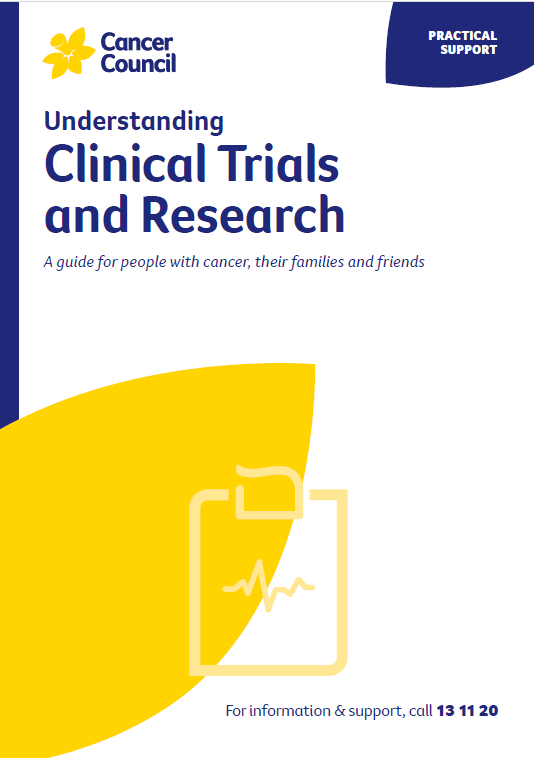- Home
- About Cancer
- Cancer treatment
- Clinical trials and research
- Clinical trials explained
Clinical trials explained
Clinical trials help find better ways to diagnose, treat, and manage cancer. They test new treatments to see if they are safe and work well before they become standard care.
Learn more about:
- Overview
- What are clinical trials designed to do?
- The phases of a clinical trial
- Randomised controlled trials
- Non-randomised trials
- Other types of clinical research
- Video: What is a clinical trial?
Overview
Cancer clinical trials are research studies that use volunteers to test new ways (interventions) to diagnose, treat and manage cancer. If a trial proves that a test, treatment or other intervention is better than existing options, it may become the new standard of care for patients in the future.
A medicine or another intervention can be developed in a laboratory and tested on animals, but it is only once it has been tested on the human body that we can know it works in people. It also has to be tested on enough people to show that any benefit is not just a random effect for a single person.
What are clinical trials designed to do?
A clinical trial will be designed to answer a particular type of research question.
| Treatment trials | These test new treatments, new ways of giving existing treatments, or new combinations of treatments. They look at whether the treatment works and if it causes side effects. The treatments that can be tested include:
|
| Prevention trials | These work out whether medicines and health programs lower the risk of developing diseases such as cancer. |
| Screening trials | These look at new methods of detecting diseases before symptoms appear. |
| Diagnostic trials | These identify more accurate or easier tests for diagnosing a particular disease in people who have signs or symptoms. |
| Quality of life trials | These test ways to improve the comfort and quality of life of people who have cancer. They are done alongside a treatment trial. |
Find out how to get involved in a clinical trial or another type of study.
Registry trials
For most treatment trials, you will have the treatment as part of the trial. Another way researchers can compare how well different treatments work is through registry trials. A registry trial collects information from people with a particular type of cancer who are having routine treatment. It can’t be used for testing new treatments, but it can answer a range of questions about existing treatments.
Your cancer treatment team may talk to you about joining a registry trial. If you choose to join the registry, you agree to share your health information, such as your medical history, the treatments you are having and the results of tests. This information will then be compared with information from many other patients to work out which treatment approaches are the most effective.
Registry trials are a cost-effective way to run a clinical trial and they allow many more people to participate in cancer research.
→ READ MORE: The phases of a clinical trial
Video: What is a clinical trial?
In this video, Medical Oncologist Dr Elizabeth Hovey explains what clinical trials are and how they can improve cancer treatment.
Podcast: Making Treatment Decisions
Listen now
More resources
All updated content has been clinically reviewed by A/Prof Brett Hughes, Senior Staff Specialist, Medical Oncology, Royal Brisbane and Women’s Hospital and The Prince Charles Hospital, and Associate Professor, The University of Queensland, QLD. This edition is based on the previous edition which was reviewed by the following panel: A/Prof Brett Hughes (see above); Christie Allan, Clinical Trials Lead, Cancer Council Victoria, VIC; Dawn Bedwell, 13 11 20 Consultant, Cancer Council Queensland, QLD; Joanne Benhamu, Senior Research Nurse, Team Lead, Lung, Colorectal and Palliative Care Trials, Parkville Cancer Clinical Trials Unit, Peter MacCallum Cancer Centre, VIC; Louise Dillon, Consumer; Sabina Jelinek, Clinical Nurse Research, St John of God Murdoch Hospital, WA; Chloe Jennett, Program Coodinator, Cancer Research, Cancer Council NSW; Carmel McCarthy, Consumer; Alison Richards, Research Unit Manager, Medical Oncology Clinical Trials Unit, Flinders Medical Centre, SA; Prof Jane Ussher, Translational Health Research Institute (THRI), School of Medicine, Western Sydney University, NSW; Prof Janette Vardy, Medical Oncologist, Concord Cancer Centre, and Professor of Cancer Medicine, The University of Sydney, NSW.
View the Cancer Council NSW editorial policy.
View all publications or call 13 11 20 for free printed copies.

